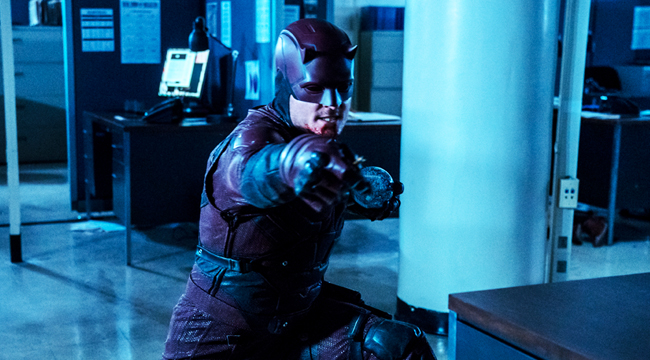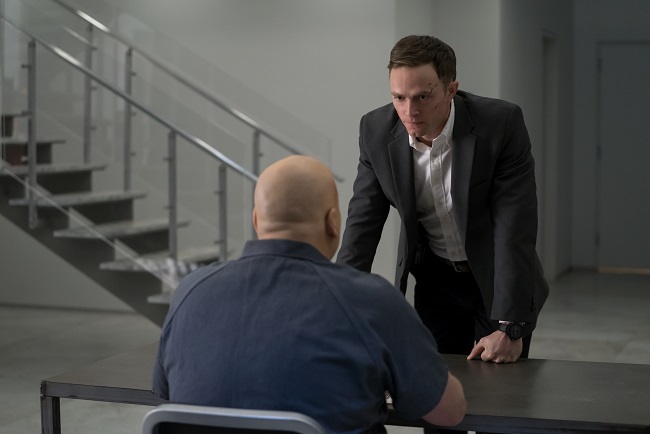
When Netflix released the final trailer for the upcoming third season of Marvel’s Daredevil series, they also previewed a brand new character: FBI Agent Benjamin “Dex” Poindexter. Played by How to Get Away with Murder alum Wilson Bethel, the troubled agent’s path will ultimately cross with the villainous Wilson Fisk (Vincent D’Onofrio) and the heroic Matt Murdock (Charlie Cox). And judging by what the trailer and the character preview have shown, these aren’t going to be quiet, cordial meetings.
Then again, fans familiar with the comics already knew this, as Poindexter takes his name from the Marvel Ultimate universe’s version of the iconic Daredevil villain Bullseye. Previously played by Colin Farrell in the 2003 movie starring Ben Affleck, the Bullseye brought to life by Bethel for the Daredevil series is more of an amalgamation of the original and Ultimate versions. And as the actor and showrunner Erik Oleson (Arrow, The Man in the High Castle) explained to UPROXX at the 2018 New York Comic Con, audiences are going to spend a lot more time with “Dex” than they may realize.
Marvel and Netflix made it perfectly clear that Wilson Fisk would be back last season. Was Benjamin Poindexter a part of that plan too, or was that something you specifically brought to the table?
Erik Oleson: In the very beginning, we talked about the introduction of a major iconic character from the Marvel world, from the Daredevil comics specifically. So yes, there was early talk about that. I’ve always been a fan of origin stories, of understanding the psychology and the many layers of a real person turning into a villain. I was not interested in any model where that character was already a villain, or anything that would have us just jumping into a story that was already in progress. It was also much more interesting to me to give a great actor like Wilson Bethel layers to play with, to better tell a story about how this particular character comes into being. So that’s what we ended up doing and I think it’s one of the cornerstones of the series this year — the role that this guy to my left here plays.
What was your first impression of Poindexter, Wilson? Whether through conversations with Erik or in reading the first scripts, what was your first take on him?
Wilson Bethel: Erik was very generous with his ideas before I had even seen enough script to have any kind of large sense of where the story was specifically going. We had a lot of conversations about who the character was, about what his backstory was going to be. Things like that. I can’t remember if it was originally presented to me this way or if this was kind of the way I interpreted the information, but Poindexter from the outset seemed very empathetic to me. This is a guy who has suffered from mental illness, or some version of mental illness, for basically his entire life. He has not been raised in a traditional family setup, and is basically a very lonely, on-the-fringes-of-society kind of guy. He wakes up every day and puts a mask on, in a way, so that he can present himself as normal to the world. In reality, everything in his life is essentially a structure of deceit to help make him seem like a healthy, normal person to everyone else.
The audiences won’t immediately see this, though. We learn more about Poindexter a few episodes in, right?
Bethel: Yes. All of that stuff, the details of his backstory, comes out in episode five. Everything that makes him relatable, in a sense. I mean, you really feel for the guy. This is a guy who does not have an easy go at life. I think one of the things that struck me about the depth Erik and the other writers gave to Poindexter is the sense that the world is full of people who, to one degree or another, are dealing with some version of psychosis. They’re dealing with some version of mental illness or mental problems, and every single day is a real challenge for them, in some way or another.
And that’s what Poindexter’s main arc is in this season. It’s the unraveling of all of the mechanisms that he used to have in place, the things that bolstered him against the hardness of the world. It’s all coming apart for him and it leads to so many horrible things. But I think what’s kind of amazing is that, as I was reading the scripts, even in the midst of all this stuff there were moments when you feel like he’s getting the raw end of the deal.
Oleson: Everybody’s the hero of their own story.

When watching that fifth episode, I wrote “he’s a hero tipped in the wrong direction” or something to that effect.
Oleson: That was one of the underlying ideas of the show this season. There are people who can go either towards the light or the dark. And when you have a corrosive tyrant or a narcissistic villain who rises up, in any society, and appeals to the darker natures of people, those who could have been functional and positive members of society will be drawn towards that.
Bethel: He actually was a successful member of an organization that upholds, to one degree or another, the values of this country. He’s in the FBI when we first meet him, and before that, the military.
Oleson: He saves lives for a living. I mean, in his backstory Poindexter has saved a lot of innocent people’s lives, be it during bank heists as an FBI sniper or other operations. He was a functional member of society who had built these support systems into his life that allowed him to function as a good person. Then in comes Wilson Fisk, who appeals to all of these darker aspects of Poindexter’s character. He basically figures out how to destabilize him and uses that knowledge to exploit him. He does so intentionally, and in a way that the villains in real life seek to figure out our weaknesses and our fears. So that they can exploit them on their way to power.
You’re using all of these analogies without mentioning a specific person whose name is on the tips of everyone’s tongues these days. I’m surprised you’re not just going for it!
Oleson: Yeah, okay, I’m going for it! If you’re going to give me the keys to Marvel’s flagship Netflix show, then I’m going to say something that means something to me. Sorry! But even then, you can look at what’s happening in Turkey, Holland or France right now, in terms of their far-right political movements. This is not just a domestic situation. These personalities are coming up in different corners of the world, mostly at around the same time, and it’s becoming the flip side of democracy. I very much wanted to use this season to expand upon that, and then prescribe a possible solution to it all, at least as I see it. The power of the press, the power of the law, the power of collective action — those are three positive things that people can use to defeat these types of narcissistic tyrants.
As is often the case with Marvel, the performers have to train a lot, so they can do a lot of physically rigorous stuff. If I’m not mistaken, Wilson, you or someone else posted something about this on Instagram…
Bethel: That doesn’t sound anything like me!
…and it was swiftly removed. Has this been one of the more physically intense roles of your career?
Bethel: No question about it. I mean, I’ve done different types of action work in the past, but nothing nearly as intense as this, at least in terms of the individual fight scenes and longer, sustained action set pieces over the course of several shooting days throughout the season. There’s really nothing like it that I’ve ever experienced before. That being said, I’m pretty game for it all. I just enjoyed the hell out of it. I consider doing that kind of stuff to be part of a dream job, in terms of getting to be able to do serious and dramatic acting work, but also being able to throw things around, flip things over and shoot everything else. We also had an incredible stunt team on the show that I worked very closely with for a month or two before we started shooting. I continued working with them while we were shooting the season. Having someone like Charlie to show me the ropes also was very very helpful.
‘Daredevil’ season three is now available to stream on Netflix.
